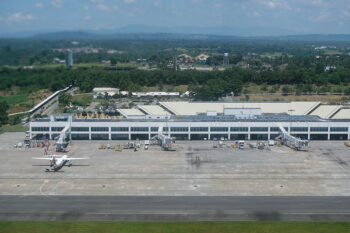CAGAYAN DE ORO CITY (MindaNews/19 August)–Although Malacañang has said that there will be no more pork, don’t bank on it.
No less than the Catholic Bishops Conference of the Philippines (CBCP) has revealed that lump sum discretionary allocations (without specifics, thus to be disbursed at someone’s discretion) are still in the national budget—suspiciously resembling the pork barrel scheme.
That’s why a signature campaign is on in Luzon and Visayas parishes—to put an effective clamp on any attempt to resurrect pork in one form or another.
Note that the proposed budget for next fiscal year will be the biggest ever in our republic’s history, at P2.6 trillion or more.
Given the current scrambling for advantage in anticipation of fierce rivalries during the next elections, the need for pork and extra perks in the run up to 2016 is gaining urgent priority among the incumbent trapos.
*****
However they disguise it, this practice of slicing big chunks from our taxes, reserving them for incumbents to spend or distribute at their discretion, does not belong in our democratic system.
Just the fact that they’ve been doing this stealthily for decades should have set off alarm bells long ago among cause-oriented groups or civil society. Remember how they camouflaged it, first as “Countryside Development Fund,” then as “Congressional Initiative Allocation, then as “Priority Development Assistance Fund”?
The problem was, so many groups and non-government organizations richly profited from pork, including insurgents whose tentacles reached deeply into the halls of Congress in the guise of party-list congressmen whose collective takings from government pork went into the billions.
That’s why patronage, dole-out, and gratuitous grants of cash or in-kind resources of government should be banished from the system for good. Anyone who attempts to revive it should be stigmatized and roundly rejected.
*****
Patronage, of course, is the power to grant political favors—power that partakes of the people’s sovereignty, which is the power to bestow authority and privilege. It is a curious development that elective officials arrogate this power; they already enjoy countless advantages!
To stretch their advantages by cannibalizing the government treasury, then give away huge portions of it to court the support of persons, groups, and institutions, is gross disregard for honesty or decency in public service.
Doing so enabled them to acquire additional power and privilege in addition to what society already bestows on them in their places of honor. They have the effrontery to compound the abuse by defying the popular will, by violating the canons of ethical political conduct—oblivious to its negative on the public interest and the common good.
Even simple logic ought to deter them from doing so! Isn’t it obvious that granting political favors is not their job; that serving the people is?
Determining what public works are to be constructed is not their duty either; proposing legislation for the purpose is. Nor is supervising infrastructure projects their responsibility; to insist on doing so is abuse of authority.
*****
To deny that pork is legalized misuse, abuse, or overuse of public funds is the height of disregard for the public interest.
Can it be that they’re unaware of their paramount mandate, which is legislation? But how can they miss knowing that pork privileges constitute trespass upon the jurisdiction of the Executive Branch?
No ethical consideration justifies abuse of pork. No principle necessitates it. No public mandate supports it. And no law ordains it.
Not only is dispensing patronage or political favors not a part of their legislative duties, using public funds to build up their public image or to ensure their re-election is unethical.
*****
Yet both Malacanang and Congress have been dignifying such impropriety and abuse, even encouraging legislators to avail of them routinely, vesting abuse with an “official” mantle, making it appear perfectly legal!
In fact, it is the constituents of the barangay, town, city, or province—through their respective local development councils—that are supposed to do the identifying and overseeing of infrastructure projects in their respective jurisdictions, not any Congressman or Senator.
The mandate resides in the constituents to determine the nature, scope, and standards of development for their community, not Congressmen or Senators.
Instead, using the persuasive power of pork, Congressmen and Senators shamelessly arrogate the mandate for themselves. As a result, instead of helping the community and its government develop autonomy or self-governance, Congressmen and Senators become barriers to it, corrupting the people and their officials, making them dependent on patronage.
Let’s face it: PORK IS BAD! To allow it to continue, to let the long-standing status quo prevail is to distort the concept of Daang Matuwid and cynically fool the people into thinking that reforms are taking place. (Manny is former UNESCO regional director for Asia-Pacific; secretary-general, Southeast Asian Publishers Association; director, Development Academy of the Philippines; member, Phil. Permanent Mission to the U.N.; vice chair, Local Government Academy; member, Cory Government’s Peace Panel, and PPI-UNICEF awardee for outstanding columnist. You may reach him at valdehuesa@gmail.com)







